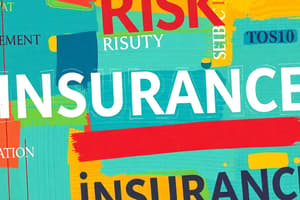Podcast
Questions and Answers
What is the definition of 'Risk'?
What is the definition of 'Risk'?
- A contract for transferring risk to an insurance company
- A contractual arrangement where one party assumes liability
- A condition or situation that presents a possibility of loss
- The chance or uncertainty of loss (correct)
What does 'Exposure' refer to?
What does 'Exposure' refer to?
- Possibility of gain
- The cause of loss
- A condition or situation that presents a possibility of loss (correct)
- The chance of loss
What is a Hold Harmless Agreement?
What is a Hold Harmless Agreement?
A contractual arrangement where one party assumes the liability of a situation and relieves the other party of responsibility.
The four ways to manage risks are: Avoid risk, Control risk, Retain a risk, and ______.
The four ways to manage risks are: Avoid risk, Control risk, Retain a risk, and ______.
What is insurance?
What is insurance?
The Law of Large Numbers states that the more examples used to develop any statistic, the less reliable the statistic will be.
The Law of Large Numbers states that the more examples used to develop any statistic, the less reliable the statistic will be.
What type of risk involves both the possibility of gain and loss?
What type of risk involves both the possibility of gain and loss?
What is an example of Pure Risk?
What is an example of Pure Risk?
What is Insurable Interest?
What is Insurable Interest?
What is 'Peril' in insurance terminology?
What is 'Peril' in insurance terminology?
What does 'Hazard' refer to?
What does 'Hazard' refer to?
A greater spread of risk makes it less likely for an insurance company to experience catastrophic loss.
A greater spread of risk makes it less likely for an insurance company to experience catastrophic loss.
What is a Physical Hazard?
What is a Physical Hazard?
What is Morale Hazard?
What is Morale Hazard?
What is Moral Hazard?
What is Moral Hazard?
Flashcards are hidden until you start studying
Study Notes
Insurance Terminology Overview
- Risk refers to the chance or uncertainty of experiencing a loss.
- Exposure signifies a condition or situation that opens the door to potential loss.
- Hold Harmless Agreement is a contract whereby one party accepts all liability, freeing the other from responsibility.
- Four methods of risk management:
- Avoid risk
- Control risk
- Retain risk
- Transfer risk
Core Insurance Concepts
- Insurance is a contract that transfers risk from an entity to an insurance company, which, for a premium, agrees to cover losses through a pool of collected premiums.
- Law of Large Numbers asserts that a larger sample size leads to more reliable statistics, enhancing predictive accuracy.
- Speculative Risk involves both the potential for gain and the potential for loss.
- Pure Risk solely involves the possibility of loss, with no chance for gain.
Fundamental Insurance Principles
- Insurable Interest mandates that one must have a financial stake in the property to benefit from insurance, ensuring there is a genuine risk of financial loss.
- Peril is identified as the specific cause of a loss.
- Hazard encompasses factors that elevate the chances of a loss occurring.
Types of Hazards
- Spread of Risk indicates that a broader distribution of risk diminishes the likelihood of catastrophic losses for an insurance company.
- Physical Hazard arises from the condition, occupancy, or use of the property itself.
- Morale Hazard occurs when an individual’s negligence or irresponsible behavior increases the risk of loss.
- Moral Hazard arises when someone intentionally creates a situation leading to a loss to profit from insurance claims.
Studying That Suits You
Use AI to generate personalized quizzes and flashcards to suit your learning preferences.




